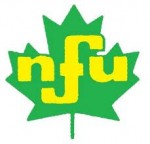NFU Commentary on the PPS: Cherishing and Protecting Land for Future Generations
Posted: April 15, 2014
Categories: Food in the News
 by Ann Slater, National Farmers Union Vice President (Policy) and St. Marys area farmer
by Ann Slater, National Farmers Union Vice President (Policy) and St. Marys area farmer
At a meeting in Prince Edward Island earlier this year, members of the National Farmers Union (NFU) said that anytime the NFU speaks of farm land, we are speaking about all land, we are speaking about water, we are speaking about woodlands and we are speaking about the air we breathe. They went on to say that we view land, water, air and the life they support as natural gifts to be cherished and protected – not as commodities to be exploited.
Along with many other farm organizations and environmental groups, the NFU has long been concerned about the ongoing loss of Canada’s most productive farm land as a food-producing resource base for future generations, as more of it is paved over or dug up every day. We believe that the preservation of farm land requires close cooperation between all levels of government along with direct and meaningful input from local communities.
As an organization of small and medium sized family farmers, the NFU also recognizes that we can best care for the land if our farms are financially viable. Along with policies to protect farm land, water, air and biodiverse ecosystems from inappropriate development, we need policies which help make farming an economically viable activity. One of the strategies some NFU members have adopted to make their farms more economically viable has been to tap into the interest in local food through direct-from-the-farm sales, on-farm processing and locally-based distribution channels.
The Ontario Provincial Policy Statement (PPS) lays out the broad foundation on how land, including farm land, should be used in Ontario. The latest revision of the PPS was released to the public in late February. This revision recognizes the economic opportunities local food can provide in agricultural areas and recommends better support for and promotion of on-farm diversification in land use policies. However, given the length of time it has taken the provincial government to complete the 5-year review of the 2005 PPS, it is disappointing, but not surprising, to find that the changes are minor and do not strengthen the protection of the land, water and air that are required to sustain life.
In 2012, during the review of the PPS, several organizations including the NFU and Sustain Ontario sent a joint letter to several Ontario ministers expressing concern about the failure of the PPS to protect prime farm land and significant natural heritage features from aggregate extraction. In particular, the farm and environmental organizations who signed the letter requested the following revisions to the PPS:
- 1. Revise section 2.5.4.1 so that aggregates extraction is strictly prohibited on prime farmland (Classes 1 – 3) and in specialty crop areas, without exception.
- 2. Remove in its entirety proposed section 2.5.3.2, which opens the door to aggregates extraction in significant wetlands, significant woodlands, significant wildlife habitat and the significant habitat of endangered and threatened species, and on lands adjacent to these features. Aggregates extraction must be prohibited in these areas, without exception.
The letter went on to note that “in an era of climate change, ongoing biodiversity loss, and increasing public demand for local foods, the government must not allow aggregates extraction to take priority over the protection of these other values“.
If the PPS is an overarching statement on land use priorities in Ontario, it is clear that aggregates and urban and industrial developments are still deemed more important than growing food for present and future generations. Within the NFU’s Policy Statement is our commitment “to develop a sense of stewardship on the concept that we really never own land; we use it carefully while we hold it in trust for those who must use it after us“.
The work to make significant changes to our land use policies Ontario must continue in the political arena, within our own organizations and in public discussions, if we are to protect and cherish the gifts of the land necessary for our own survival.
